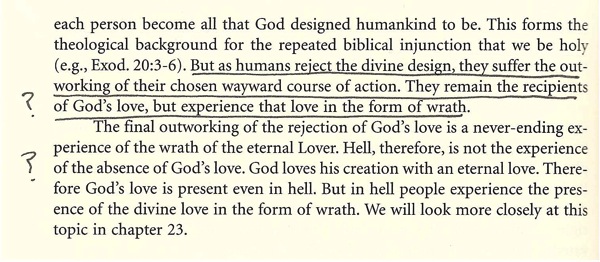So, I’m reading Theology for the Community of God by Stanley Grenz in preparation for a sermon I’m giving on Trinity Sunday. Before I get into the thick of it let me tell you, this is a fine book. His understanding of the Trinity is very well done. In fact, I’ll use a good portion of what he writes as a basis for my sermon.
BUT, I came to the following section and I had some questions. I have some uneasiness in the way he makes the jump from love to wrath.


- What do you think about this section in general?
- I agree with the highlighted portion of the above, but I am not sure that it necessitates “wrath” as Grenz states. What do you think?
- Grenz writes,”Simply stated, the presence of sin transforms the experience of the divine love from the bliss intended by God into wrath.” This seems like a leap to me, what do you think about it?
- Is his definition of “wrath” as “love’s jealousy” accurate, fair, your understanding?
Thanks for your help people.
-jpserrano

1) I’m trying to figure out what else is in this book that you like so much, because this section is a huge turn-off. It’s like the opposite of Love Wins.
2)I’m not solid on the sentence.
3)I’m going to stop numbering now.
This may not suprise you, but I don’t believe in a wrathful, punishing God. I think that we screw things up on our own just fine, TYVM. By his logic, we would only experience God’s wrath because sin is always present. We can’t escape it. Simul justus… you know what I’m sayin’.
I find his statement that love always has to be jealous to be really messed up. Jealousy, for me, connotes fear and lack of confidence, which aren’t attributes I find present in God. And the idea that, without jealousy, love degenerates into sentimentality is downright dangerous in human affaird. In short, I sure wouldn’t want to date this guy.
Let me know what you find in chapter 23.
This book is actually very good even though he takes some odd tangents sometimes. I think sometimes we hear wrath and it automatically stirs within us a deep feeling and a rejection of what he is saying; it did for me at first. I have sat with this for a while now and am truly trying to understand how he makes this leap. I think maybe the words he uses are poor and not the idea. If his thesis statement is the highlighted part, I think he is on to something. I just wouldn’t use “jealous” or “wrath”.
1. Agreed with your early comment that I’m having trouble making the leap with him.
2. The only way I can make sense of the line AFTER what you highlighted is that if someone doesn’t WANT the affections of another, they could conceivably be received as wrath…I’m a big C.S. Lewis fan, and “The Great Divorce” expresses similar sentiments. It’s still a heavy thought that needs a ton of unpacking.
3. Closely related, sin is essentially insistence on one’s own way instead of God’s. Again, an Authority opposed to my own will feel like wrath if I refuse to submit – not because God is spiteful, but because God will not cease to be God just to appease the little line I’ve drawn in the sand, and when I lock myself in my room claiming I’ll never come out, I will always feel like the one being punished, no matter how self-imposed it may be. “Submit” isn’t a popular word in contemporary circles, but it’s a pretty key part of any loving relationship; vulnerability that leads to depth almost always begins with willingly submitting to the power of another.
4. His definition of wrath as love’s jealousy really confuses me and flies in the face of everything I’ve mentioned above, so either he lost me, or we were never on the same page to start with